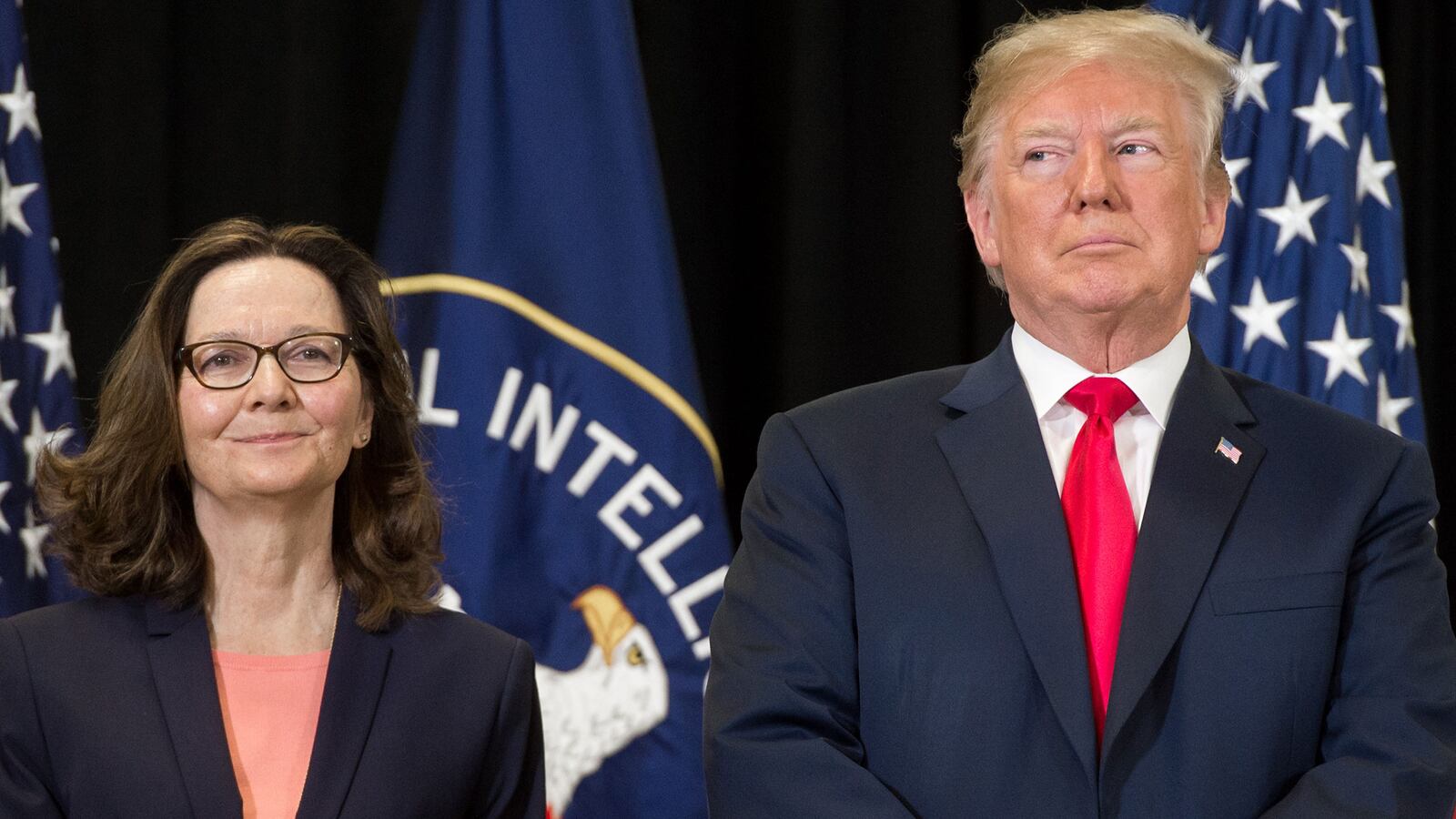The White House blocked CIA Director Gina Haspel from attending a highly anticipated Senate briefing on Saudi Arabia, Yemen, and the murder of journalist Jamal Khashoggi, Secretary of State Mike Pompeo and Defense Secretary James Mattis told senators on Wednesday.
“The most persuasive presence at this briefing was an empty chair—a chair that should have been occupied by Gina Haspel, head of the Central Intelligence Agency,” Senate Minority Whip Dick Durbin (D-IL) told reporters. “We were told at this briefing that it was at the direction of the White House that she not attend.”
Several senators confirmed to The Daily Beast that Mattis and Pompeo told senators at the classified briefing that the White House prevented Haspel from attending. Lawmakers, including Sen. Bob Corker (R-TN), the chairman of the Senate Foreign Relations Committee, had specifically asked for Haspel to brief senators on the U.S. intelligence community’s assessment about the murder of Khashoggi. Thanks to the Turkish government, Haspel reportedly has heard a gruesome audio recording of Khashoggi’s final moments.
The CIA, for its part, contradicted Mattis and Pompeo’s account.
“While Director Haspel did not attend today’s Yemen policy briefing, the Agency has already briefed the Senate Select Committee on Intelligence and Congressional leadership on the totality of the compartmented, classified intelligence and will continue to provide updates on this important matter to policymakers and Congress,” CIA spokesman Timothy Barrett said in a statement. “The notion that anyone told Director Haspel not to attend today's briefing is false.”
Haspel’s absence fueled the exact opposite result their briefing was meant to accomplish—to shore up support for the bloody U.S.-backed Saudi-Emirati war in Yemen. As Sens. Bernie Sanders (I-VT) and Mike Lee (R-UT) are set to force a vote on ending Washington’s support for the conflict, previously undecided senators left the briefing indicating they will join an effort that would deliver a forceful rebuke to President Donald Trump and two key authoritarian Mideast allies.
Corker, who has historically backed U.S. involvement in Yemen, said he was inclined to vote to advance the Sanders-Lee resolution in the absence of a sufficient White House response to the Khashoggi killing.
“I have laid on the railroad tracks to keep us from doing things that I believe are against our national interest, as it relates to Saudi Arabia,” Corker said. “But I may now be willing to get on the [Yemen] vehicle, knowing it can be amended, to figure out some way for us to send the appropriate message to Saudi Arabia that appropriately displays American values and American national interest.”
U.S. intelligence has reportedly concluded that one of the Yemen war’s key architects, Saudi Crown Prince Mohammed bin Salman, is the crucial figure in Khashoggi’s grisly October murder and dismemberment inside the kingdom’s Istanbul consulate.
“I think the administration would do themselves well by figuring out a way to respond to this because... we’ve got an imbalance here where something has occurred that has not been addressed,” Corker told The Daily Beast. He said he asked Mattis and Pompeo to “share with us what they’d like to see [Congress] do,” but “they could not.”
“The White House can fix this this afternoon. They can fix it in an hour. The secretary of state can fix it in an hour,” Corker added. "It’s like we’re dancing on the head of a pin to keep from—look, [MBS] is responsible for this death.”
Haspel’s forced absence aggravated senators even as her colleagues pleaded for the Senate to hold the line on a Yemen war they portrayed as crucial to the longstanding U.S-Saudi partnership on fighting terrorism.
“We must maintain our twin requirements of holding those responsible for the murder to account, while recognizing the reality of Saudi Arabia as a necessary strategic partner,” Mattis told the Senate, though the administration has balked at holding bin Salman accountable and Trump has repeated the crown prince’s denials.
But Sen. Chris Murphy, a Connecticut Democrat who is co-sponsoring the Sanders-Lee effort, said the secretaries “did not win any votes in that hearing… I am more confident after that briefing that we have the votes” to end U.S. involvement in the Yemen conflict—and that’s mostly because the Trump administration has not outlined a plan to hold Saudi Arabia accountable for the murder of Khashoggi, senators said.
“The Goldilocks solution is, absolutely, the administration forcing Saudi Arabia to take ownership over what has happened with the journalist, and putting in place appropriate policies relative to what they’re doing as it relates to innocent civilians,” Corker added.
Pompeo, who was photographed laughing with the crown prince in Riyadh shortly after Khashoggi’s execution and dismemberment, previewed his message in a defiant Wall Street Journal op-ed that defended the Saudis as a regional bulwark against Iran.
Pompeo’s op-ed portrayed Yemen, where U.S.-provided bombs from Saudi warplanes have brought 14 million people to the brink of starvation, as a key locale in “root[ing] out Iran’s destabilizing influence.” He claimed that the U.S. has “exerted effort to improve Saudi targeting to minimize civilian casualties.” According to Pompeo’s prepared remarks, the secretary told senators the administration’s efforts “have actually made [the Yemen war] less ugly.”
On Wednesday, Pompeo maintained his confrontational tone. According to prepared remarks released by the State Department, he told senators, “I know many of you think it’s time to pack up and abandon the role [in Yemen] we’ve been playing since the previous administration. I’m here to tell you why that’s a bad call.”
Mattis, for his part, asserted that the U.S. teaches the Saudis procedures “for identifying no-fire and restricted-fire areas,” though human-rights workers on the ground in Yemen continue to detail civilian devastation, such as fighting near hospitals.
That training is less than meets the eye, according to experts. “The stuff Mattis is talking about there is targeting 101, bringing lawyers over and talking about the law of armed conflict,” said Larry Lewis, a former senior State Department adviser on human rights who worked with the Saudi-led coalition to reduce civilian casualties in 2015 and 2016.
The procedures Mattis referred to are for pre-planned targets, but Lewis said the vast majority of strikes the Saudis take in Yemen are “dynamic” strikes on targets of opportunity: “Just about every incident that’s come to light on civilian casualties, like hitting hospitals, those are dynamic strikes. If they’re adding measures, I’m not really sure I believe it, but they’re working on the wrong thing.”
The three-year old Yemen war has featured a catalogue of atrocities, from bombed hospitals to flattened school buses to a cholera outbreak. In September, responding to international outrage over the U.S.-backed war, Mattis and Pompeo certified to Congress that the Saudis and Emiratis are taking “demonstrable actions to reduce the risk of harm to civilians and civilian infrastructure.”
Yet this month the coalition intensified its onslaught, despite administration calls for a ceasefire. In the port city of Hodeidah, Doctors Without Borders warned last week that the war was risking the health and safety of one of the city’s remaining functional hospitals. “Our staff can hear explosions and shootings occurring extremely close by every day around Al-Salakhana hospital,” the organization’s local operations manager, Caroline Segui, said in a statement.
This latest offensive has unfolded amidst the geopolitical backdrop of the Khashoggi murder. Executing the Washington Post columnist in Saudi Arabia’s Istanbul consulate has created the first prolonged crisis for bin Salman, whom Trump’s media allies and influential New York Times columnist Thomas Friedman had beatified. And it’s strengthened the hand of congressional foes of a Yemen war that both the Obama and Trump administrations skipped over Congress to back.
Sensing the growing legislative discontent around the war, the Trump administration suspended the midair refueling of Saudi warplanes earlier this month, but continued to provide intelligence for airstrikes and other aspects of the assault. It didn’t stem the tide. After the midterm elections, a bipartisan House effort to end U.S. involvement was expected to pass the chamber before Speaker Paul Ryan (R-WI) thwarted it. Mattis is scheduled to host a tribute to Ryan at the Pentagon on Wednesday afternoon.
In the Senate, Sanders’ complementary effort is on the brink of passage. Though his bill failed in March on a 55-44 margin, Sanders and his allies now claim to have the support of a majority of senators after winning over Democratic skeptics—thanks in no small part to outrage over Khashoggi, as the Yemen war is one of the only available mechanisms for legislators to object to what they consider impunity for the crown prince. Parliamentary maneuvers over the resolution on Wednesday were expected to produce a vote on it next week.
“I think we have the votes,” Sanders said after the briefing.
Even if the resolution passes the Senate, it won’t get the U.S. out of the war, thanks to Ryan. But its supporters expect it to stand as a rebuke to Trump, bin Salman, and their Emirati ally Mohammed bin Zayed–something rare from the Senate on a matter of war. They think they can move toward an endgame for the war in the next Congress, since Ryan’s maneuver put the likely next speaker, Nancy Pelosi (D-CA), on the side of the anti-war forces. “Real, immediate action must be taken by the Congress to end this horrific humanitarian crisis,” Pelosi said afterward.
But Mattis argued to the senators that they have no jurisdiction to contest the war. His objection is that U.S. aid to the war effort is so indirect as to not require any form of congressional authorization. It’s an argument Mattis’ attorneys made to the Senate earlier this year.
A spokesperson for U.S. Central Command punted to the Pentagon questions from The Daily Beast about restrictions placed on U.S. aid to the Yemen war. Spokespeople at the Pentagon did not immediately respond.
“I must note we are seldom free to work with unblemished partners,” Mattis told the senators.
A senior Democratic aide who was not cleared to speak to reporters marveled at the administration’s unforced errors at the Mattis-Pompeo briefing. “The administration clearly wanted to use this briefing to hit the brakes on this effort,” the aide said, “and that clearly failed.”









